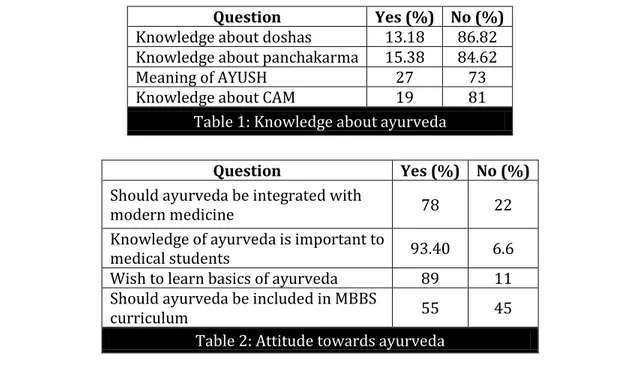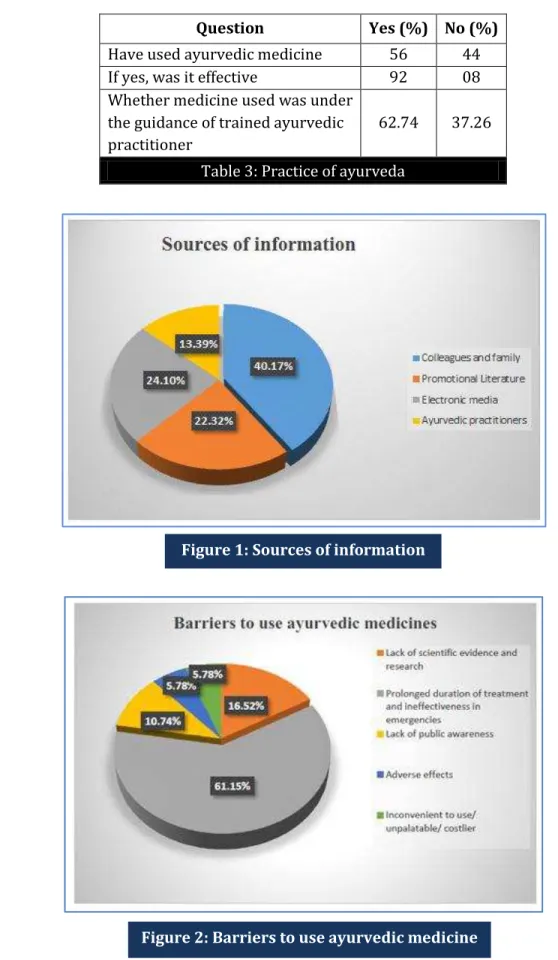J of Evolution of Med and Dent Sci/ eISSN- 2278-4802, pISSN- 2278-4748/ Vol. 4/ Issue 02/Jan 05, 2015 Page 223
KNOWLEDGE, ATTITUDE AND PRACTICES TOWARDS AYURVEDIC
MEDICINE USE AMONG SECOND YEAR MBBS STUDENTS
Mankar N. N1, Zad V. R2, Agharia M. M3, Sawant S. D4, Bansode A. A5
HOW TO CITE THIS ARTICLE:
Mankar N. N, Zad V. R, Agharia M. M, Sawant S. D, Bansode A. A. Knowledge, Attitude and Practices towards Ayurvedic Medicine use among Second Year MBBS Students . Journal of Evolution of Medical and Dental Sciences 2015; Vol. 4, Issue 02, January 05; Page: 223-227, DOI: 10.14260/jemds/2015/36
ABSTRACT: BACKGROUND: In India, Ayurveda is the most widely used form of complementary and alternative medicine (CAM). This study was aimed at understanding the knowledge, attitude, and practice (KAP) of medical students towards ayurvedic medicine use. METHODS: It was a cross-sectional and prospective study. After the approval from Institutional Ethics Committee, II year medical students were approached and were given preformed validated questionnaire to assess KAP towards ayurvedic medicine use. RESULTS: Majority of the students were unaware of the concept of CAM while only 19% could explain it. 27% students could elaborate the term AYUSH. Most of the students had very little knowledge about the doshas and panchakarma. Most of the students heard of Ayurveda from family and colleagues. Many students (78%) were in favour of integration of ayurvedic and conventional therapies. Though most of the students (89%) wished to learn the basics of Ayurveda, 55% students were not in favour of Ayurveda being included in MBBS curriculum. Out of the total students who used ayurvedic medicines, 92% found it to be effective. For most of the students, delayed relief and prolonged duration of treatment were the barriers to use ayurvedic medicines. CONCLUSION: This study reveals that the medical students had little knowledge about Ayurveda though they showed positive approach in learning and practicing the same.
KEYWORDS: Ayurvedic medicine, MBBS students.
INTRODUCTION: Ayurveda is the most commonly practiced form of complementary and alternative medicine (CAM) in India. About 80% of Indian patients use ayurvedic therapy.[1] Ayurvedic therapy is
becoming more and more noticeable from the point of view of dissatisfaction with modern medicine. Although the therapeutic value of several ayurvedic medicines have been established; for many others, this is not the case, often because the research has not been done.[2] Recently integrative
medicine approach came forward with the optimism of providing affordable solution to healthcare crisis in developing countries like India. Department of AYUSH under the Ministry of Health and Family Welfare proposed integration of ayurveda, siddha, unani and homeopathy with allopathic system to ensure health for all citizens across the country.[3] The role of integrative medicine is still in
infancy in India.[4] The scope of integration between ayurveda and allopathic medicine in future will
be greatly influenced by the attitude of medical students.
AIM: This study was aimed at assessing the knowledge, attitude, and practice (KAP) of medical students towards ayurvedic medicine use.
MATERIAL AND METHODS:
Type of study - Cross sectional, questionnaire based.
J of Evolution of Med and Dent Sci/ eISSN- 2278-4802, pISSN- 2278-4748/ Vol. 4/ Issue 02/Jan 05, 2015 Page 224
Duration of study – 4th January 2014 to 12th February 2014.
Sample size – The study was carried out in total 98 second year MBBS students.
Study tools- Students were provided predesigned questionnaire based on study objectives.
RESULTS: Out of the total 98 questionnaires received, 7 were incompletely filled and hence were excluded, resulting in a response rate of 92.85%.
KNOWLEDGE ABOUT AYURVEDA: 86.82% of students did not have knowledge about doshas while 84.62% of student did not have knowledge about panchakarma. Only 27% students could elaborate the term AYUSH, and only 19% students had knowledge about complementary and alternative medicine (CAM).
ATTITUDE TOWARDS AYURVEDA: 78% of students were of the opinion that ayurveda should be integrated with modern system of medicine. 93.40% students thought that knowledge of ayurveda is important for medical students. 89% of students wished to learn the basics of ayurveda, however only 55% opined that ayurveda should be included in MBBS curriculum.
PRACTICE OF AYURVEDA: 56% of students had used ayurvedic medicines themselves out of which 92% found them to be effective for the respective disease conditions, but only 62.74% of students took those medicines under the guidance of trained ayurvedic practitioner.
SOURCES OF INFORMATION: For 40.17% of students the source of information about ayurvedic medicines was colleagues and family, 24.10% students used electronic media to find information regarding ayurvedic medicines. 22.32% of students obtained information through promotional literature and 13.39% students asked ayurvedic practitioners for information.
BARRIERS TO USE AYURVEDIC MEDICINE: Majority of students (61.15%) thought that the main barrier to use ayurvedic medicine was prolonged duration of treatment and ineffectiveness in emergencies. The other barriers were lack of scientific evidence and research (16.52%), lack of public awareness (10.74%), inconvenience to use/ unpalatability/ cost (5.78%), adverse effects (5.78%).
DISCUSSION: This study investigated KAP regarding ayurvedic medicine use among second year MBBS students. Very few participants had knowledge of doshas of ayurvedai.e.13.18%, which is lesser than that observed in Gawde et al study (48%)[5] wherein resident doctors were included as
participants. Only 27% participants could explain AYUSH and 19% knew the meaning of CAM.
As many as 78% participants favoured the integration of ayurvedic and conventional therapies. Most of the participants (89%) wished to learn the basics of Ayurveda. However, 55% were not in favour of Ayurveda being included in MBBS curriculum, which is similar to the response found in Loh KP et al study (50.2%).[6]
Out of the total participants, 56% had used ayurvedic medicines while 44% had never used them. 92% of those who used the medicines had found it to be effective. This is similar to the finding in Kong FH et al study (88%).[7] Only 62.74% had used these medicines under the guidance of trained
J of Evolution of Med and Dent Sci/ eISSN- 2278-4802, pISSN- 2278-4748/ Vol. 4/ Issue 02/Jan 05, 2015 Page 225
information of ayurvedic medicines, followed by electronic media and promotional literature. In our study, prolonged duration of treatment and ineffectiveness in emergencies, posed the most common barrier (61.15%) for the use of ayurvedic medicines.
CONCLUSION: Based on the results of the study, we came to a conclusion that medical students had little knowledge about the basics of ayurveda but showed positive attitude towards learning the same. With Ayurveda’s wide acceptance and emergence of integrative approach, educational programmes for medical students and research, particularly high quality clinical trials for ayurvedic medicines are required to be conducted.
REFERENCES:
1. Verma U. Allopathic vs. Ayurvedic practices in tertiary care institutes of urban North India. Indian J Pharmacol 2007; 9: 52-4.
2. Ernst E. Herbal medicines: Balancing benefits and risks. Novartis Found Symp 2007; 282: 154-67.
3. Report by Ayush: National Policy on Indian Systems of Medicine and Homoeopathy-2002. Available from: http:www.whoindia.org/LinkFiles/AYUSH_ NPolicy-ISMandH-Homeopathy. [Last cited on 10th Jan 2014 ].
4. Bodeker G. Lessons on integration from the developing world's experience. BMJ 2001; 322: 164-7.
5. Gawde SR, Shetty YC, Pawar DB. Knowledge, attitude, and practices toward ayurvedic medicine use among allopathic resident doctors: A cross-sectional study at a tertiary care hospital in India. Perspect Clin Res. 2013 Jul-Sep; 4 (3): 175–180.
6. Kong FH, Man LK, Shetty RS, Kamath VG. Knowledge, Attitude and Practice of Complementary and Alternative Medicine (CAM) among Medical Practitioners. IJRRMS, April-Jan 2013; 3; 5-8. 7. Loh KP, Ghorab H, Clarke E, Conroy R, Barlow J. Medical Students' Knowledge, Perceptions, and
Interest in Complementary and Alternative Medicine. J Altern Complement Med. 2012; 18: 1–7.
Question Yes (%) No (%) Knowledge about doshas 13.18 86.82 Knowledge about panchakarma 15.38 84.62
Meaning of AYUSH 27 73
Knowledge about CAM 19 81 Table 1: Knowledge about ayurveda
Question Yes (%) No (%)
Should ayurveda be integrated with
modern medicine 78 22
Knowledge of ayurveda is important to
medical students 93.40 6.6
Wish to learn basics of ayurveda 89 11 Should ayurveda be included in MBBS
curriculum 55 45
J of Evolution of Med and Dent Sci/ eISSN- 2278-4802, pISSN- 2278-4748/ Vol. 4/ Issue 02/Jan 05, 2015 Page 226
Question Yes (%) No (%)
Have used ayurvedic medicine 56 44 If yes, was it effective 92 08 Whether medicine used was under
the guidance of trained ayurvedic practitioner
62.74 37.26
Table 3: Practice of ayurveda
Figure 1: Sources of information
J of Evolution of Med and Dent Sci/ eISSN- 2278-4802, pISSN- 2278-4748/ Vol. 4/ Issue 02/Jan 05, 2015 Page 227
AUTHORS: 1. Mankar N. N. 2. Zad V. R. 3. Agharia M. M. 4. Sawant S. D. 5. Bansode A. A.
PARTICULARS OF CONTRIBUTORS:
1. 3rd Year Junior Resident, Department of
Pharmacology, Dr. V. M. G. M. C. Solapur. 2. Assistant Professor, Department of
Pharmacology, Dr. V. M. G. M. C. Solapur. 3. 2nd Year Junior Resident, Department of
Pharmacology, Dr. V. M. G. M. C. Solapur.
4. Assistant Professor, Department of Biochemistry, Dr. V. M. G. M. C. Solapur. 5. Service Resident, Department of
Pharmacology, Dr. V. M. G. M. C. Solapur.
NAME ADDRESS EMAIL ID OF THE CORRESPONDING AUTHOR: Dr. Agharia M. M,
Room No. 114, Resident Doctors Hostel, Dr. V. M. G. M. C. Solapur, Maharashtra. E-mail: makbool.ali@gmail.com

